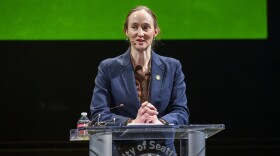The top political spenders in Washington this election year include environmentalists, unions, trial lawyers and business interests.
But there’s a group of influential players who don’t necessarily show up in the campaign finance reports: lobbyists. They often work behind the scenes to guide campaign contributions on behalf the interests they work for. It’s another way that lobbyists exert their influence over the political process.
‘What You’re Buying Is A Uniform’
A decade ago, Jim Boldt was a successful contract lobbyist in Olympia. He had roster of mostly business clients. In a good year, his firm would gross nearly a million dollars. In election years, he handed out money — campaign checks from his clients. Boldt had a ritual.

“The day after Labor Day, I’d load the checks in my motorcycle. And I’d take off and do a big loop into eastern Washington, and that was fun,” Boldt said.
During these motorcycle deliveries, Boldt says, he’d meet the candidates over coffee or a quick lunch.
“And you’d say, ‘Hey, these are from my clients, appreciate your work,’ and you’re gone. It’s a short little deal,” Boldt said.
Going to the district and handing over the checks in person was just his style; Boldt’s a face-to-face kind of guy. But he never quite got used to sliding the envelope across the table.
“That dynamic is really awkward,” he said.
So why do it? Access. Boldt would often tell his clients: “What you’re buying is a uniform. You get to be on the field. I don’t know if you’ll make the team, I don’t know if you’ll get to turn out today. But you’re going to be on the field.”
‘A Cost Of Entry’
Now, not all lobbyists have a hand in political giving. But many do and the lobbyist is often the architect of that giving because they’re the political experts.

“My value to the clients is knowing the whole game board,” said Brad Tower, a contract lobbyist in Olympia.
Tower’s clients include businesses and business associations. He often guides them in strategic political giving. And he often shows up himself at campaign fundraisers with a client’s check in hand.
“What the contributions allow me to do is to participate in different events where there is a cost of entry. Being able to make those contributions does allow me to build relationships with those individuals that carries over to session when they see me in the halls,” Tower said.
A Behind-The-Scenes Game
So far this year, lobbyists in Washington have reported nearly $6 million in political contributions. But that doesn’t capture the whole picture. Lobbyists only have to report their clients’ contributions if they deliver the checks themselves, or if they’re the one who makes the decisions about political giving. Simply advising clients on where to give and how much to give doesn’t trigger the reporting requirement. That means this realm of the lobbying business happens largely behind the scenes.
“As far as are you ever going to know what contributions lobbyists have suggested be given, I don’t think so, because that not’s what our law requires,” said Lori Anderson with Washington’s Public Disclosure Commission.
But anecdotally, it’s clear lobbyists play a significant role in Washington campaigns and elections. I spoke with several prominent lobbyists who did not want to be quoted by name. One estimates he will have a hand in guiding as much a $1 million in political giving this election cycle. His clients have a serious goal: elect business-friendly lawmakers.
Meredith McGehee is with Campaign Legal Center in Washington, D.C. The group advocates for campaign finance reform. She says the ability of one lobbyist to guide such large sums of campaign cash gives them out-sized influence.
“That ability to deliver money that is so desperately wanted by the candidate so they can keep their job is one of the most powerful arrows in the quiver for any lobbyist who wants to play that game,” McGehee said.
Efforts To Close Tax Exemptions ‘Simply Unsuccessful’
It’s not just business lobbyists. Unions, trial lawyers, environmental groups and tribes are among the biggest campaign contributors in Washington. They, too, employ lobbyists who, in some cases, help strategize political giving. The influence that lobbyists wield in Washington’s capitol troubles state Rep. Reuven Carlyle, a Seattle Democrat who chairs the Finance Committee.
“The idea that these super lobbyists are not public officials is, in effect, laughable. They have huge influence and everyone inside Olympia know it. And the question is: Should the public outside Olympia know it?” Carlyle said.
The answer, says Carlyle, is “yes.”
So why does he play along? He says as a Democrat in a safe seat, he has an obligation to help raise money that can go to other Democrats in more competitive districts. But he calls the whole situation “obnoxious.” As chair of a taxation committee, Carlyle says he’s seen firsthand the influence lobbyists can wield in the legislative process.
“There are examples where we tried to close tax exemptions, and there were two, three, four beneficiaries — a handful of companies, but because of the sheer number of super lobbyists that they have working for them, it’s simply been unsuccessful,” Carlyle said.
Lobbyists are quick to point out that lobbyists don’t have a vote; all they can do is plead their client’s case. They also say that helping out candidates with campaign cash only seems fair. After all, the rest of the year, it’s the lobbyist who’s trying to beat down the politician’s door.







